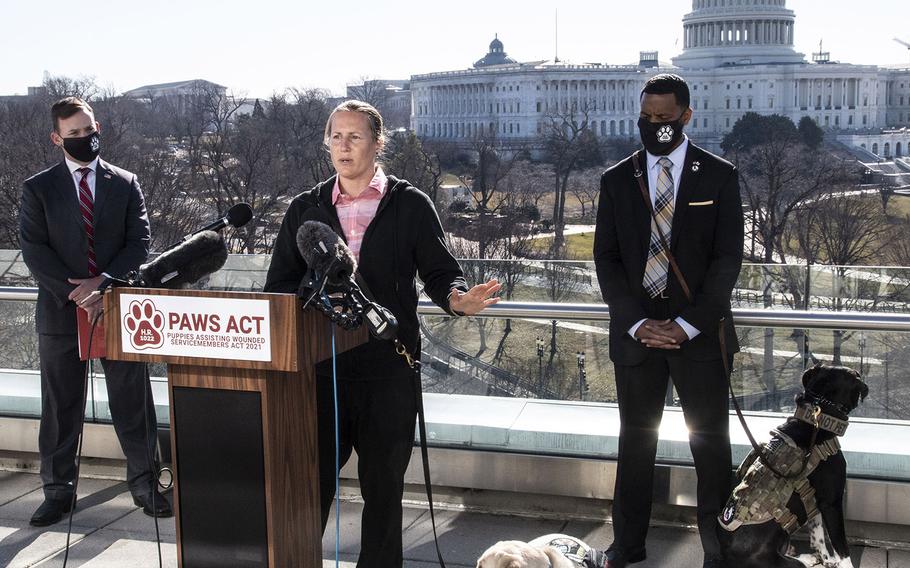
Veteran Becca Stephens, with her service dog Bobbi at her side, speaks at a Capitol Hill news conference to promote House bill, H.R. 1022, the Puppies Assisting Wounded Servicemembers (PAWS) Act, March 3, 2021. Behind her are K9s For Warriors CEO: Rory Diamond and veteran David Crenshaw and his service dog Doc (JOE GROMELSKI/Stars and Stripes)
WASHINGTON — Veterans struggling with mental health conditions will be eligible to receive service dogs through a pilot program approved by Congress.
Congress finalized a bill Friday that orders the Department of Veterans Affairs secretary to launch a five-year pilot program that provides service dog training to benefit veterans diagnosed with post-traumatic stress disorder. Now, the VA only covers some costs of service dogs for veterans with certain physical disabilities, such as blindness, hearing impairment and mobility issues but not mental health conditions.
“Many veterans with mobility impairments have had their lives changed — in some cases, saved — by service dogs,” Sen. Kevin Cramer, R-N.D., said in a statement. “Our bill would expand this treatment by launching a pilot program to make veterans with mental health issues such as depression eligible to receive service dogs.”
Cramer, along with Sens. Thom Tillis, R-N.C., Kyrsten Sinema, D-Ariz., and Dianne Feinstein, D-Calif., introduced the bill, titled the Puppies Assisting Wounded Servicemembers for Veterans Therapy Act, or PAWS Act. The bill already passed the House and was sent to the White House for President Joe Biden’s signature.
The legislation requires the VA to launch the pilot program in early 2022, and it must be carried out by at least five VA medical centers. The facilities will partner with accredited service dog organizations to perform the training.
After the pilot program ends, the VA must report back to Congress about whether the program should be extended or made permanent. If the program does continue past five years, Congress will consider expanding it to address mental health conditions other than PTSD.
Advocates for veterans with mental health issues described the bill as a “huge step forward.”
“This pilot program will help prove, again, the life-changing impact a service dog can make in mitigating a veteran’s symptoms associated with post-traumatic stress [disorder],” said Rory Diamond, CEO of K9s for Warriors. “We are on the path to service dogs being a covered benefit for veterans with PTSD.”
Mental health service dogs are task-trained to assist people with PTSD, panic disorders, anxiety disorders, depression and other conditions. They can retrieve medication, bring their partner an emergency phone, call 911 or a suicide hotline with a K9 rescue phone, turn on lights and help with emotional overload, among other things.
Some lawmakers and advocates have pushed the VA for years to help veterans with PTSD cover the costs of training service dogs. The department maintained there wasn’t enough scientific evidence showing dogs helped treat PTSD and its symptoms.
Congress directed the VA to conduct a study into the issue in 2010. The initial results were published in March. The study found veterans paired with service dogs experience a reduction in the severity of their PTSD symptoms. They exhibited fewer suicidal behaviors and ideations after 18 months of working with a service dog.
More results of the study, including its cost-effectiveness as a treatment for PTSD, are expected to be published in September.
"Veterans suffering from invisible wounds of war are now one step closer to being afforded the opportunity to seek this unique and scientifically proven treatment through VA," said Bill McCabe, director of legislative affairs at The Enlisted Association. “We now urge the president to sign this important legislation without delay."